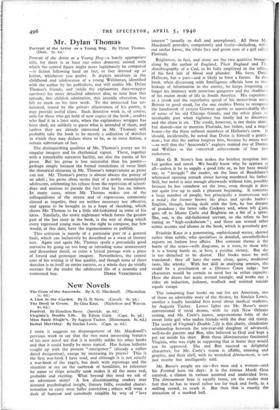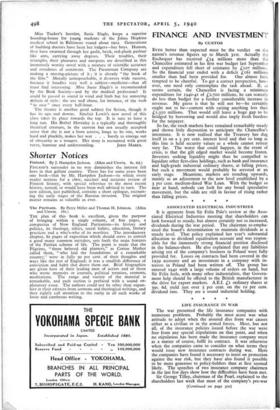New Novels
Festival. By Hamilton Basso. (Jarrolds. 9s. 6d.)
I HOPE it suggests no disparagement of Mr. Macdonell's previous work to say that the two most interesting features of his new novel are that it is notably unlike his other books and that it could hardly be more topical. Has fiction hitherto caught up with the present " emergency " (already a rather dated designation), except by increasing its prices? This is the first war-book I have read, and although it is not strictly a war-book of the 1940's, but deals with espionage and the situation at sea on the outbreak of hostilities, its reference by name to ships actually sunk makes it all the more real, probable and exciting. What beyond this need we ask of an adventure story? A few discriminating readers may demand psychological insight, literary frills, rounded charac-- terisation to carry even fuller conviction ; others will want a dash of humour and somebody tangible by way of "love
interest " (usually so dull and amorphous). All these M:. Macdonell provides, competently and freely—including, with- out undue havoc, the white face and green eyes of a girl called Florinda.
Brightness, in fact, and irony are the two qualities brought along by the author of England, Their England and Th2 Autobiography of a Cad, to be fully employed in the telling of his first tale of blood and plunder. His hero, Denis Halloran, has a past—and is likely to have a future. In this book, when discussing with Intelligence officials how to stop leakage of information to the enemy, he keeps forgetting to forget his intimacy with notorious gangsters and the shadiness of his recent mode of life in South America. His experience as a crook and the superlative speed of his motor-boat serve Britain in good stead, for the one enables Denis to recognise the handiwork of certain German agents as unmistakably that of some of his old Chicago friends, and the other plays an invaluable part when vigilance has finally led to discovery and the chase is on. The credit, however, is not theirs alone, but shared—not to mention Florinda, her father, and a negr- boxer—by the three stalwart members of Halloran's crew. I should, incidentally, be noted that Denis is himself a gentle- man ; but this the author forgives him, because he mixes well —so well that the Anaconda's ' exploits remind one of Dumas and Wallace as the concerted achievement of four just racketeers.
Miss G. B. Stern's lion makes the briefest irruption into her garden and novel. We hardly know why he appears at all—unless it be to supply a good title or, as her hero would say, to " inviggle " the reader, on the lines of Baudelaire's whimsical opening remark about having murdered his father. Still, her novel is nice enough afterwards without him, possibly because he has somehow set the tone, even though it does not quite live up to such a pleasant beginning. It concerns a large number of people, but principally a manservant and a maid ; the former knows his place and speaks butler', English, though, having dealt with the lion, he has dreams of grandeur ; the latter talks Cockney and, when left L300, goes off to Monte Carlo and Brighton on a bit of a spree. She, too, is the old-fashioned servant, so she refers to her outing as " high-cockalorum " ; and there are several other comic accents and idioms in the book, which is genuinely gay.
Fraulein Kaus is a penetrating, sophisticated writer, shrewd rather than subtle, who specialises in detailed, unembellished reports on forlorn love affairs. Her constant theme is the battle of the sexes—with diagrams, as it were, to show why it is a losing battle or, at best, a pyrrhic victory. But she is too detached to be dismal. Her books must be well translated : they all have the same clean, queer, medicinal taste, like whisky. With her skill in analysing amours, she could be a psychiatrist or a Divorce Court judge: her characters would be certain to need her in either capacity. Here she draws her acute eternal triangle, and works out a rider on seduction, jealousy, wedlock and assisted suicide equals escape.
The remaining four books on our list are American, one of them an admirable story of the theatre, by Sinclair Lewis, another a loudly heralded first novel about medical students, by Augusta Tucker. Lesser lights are Mr. Basso's more conventional if vivid drama, with its rich New Orleans setting, and Mr. Corle's jaunty, unpretentious fable of the sweet little girl who makes friends-with the dear old tramp. The secret of Virginia's Double Life is this chatty, clandestine relationship between the ten-year-old daughter of advanced, well-to-do parents and Ben, who believed in God and kept a pet rat inside his shirt. Both these idiosyncrasies fascinated Virginia, who was right in supposing that at home they would not be approved. She and Ben succeed as delightful characters, for Mr. Cork's vision is affable, amusing and graphic, and their idyll, with its wretched denouement, is not just mushy but intelligently told.
Mr. Basso's people are six—five men and a woman—and his Festival lasts six days : it is the riotous Mardi Gras carnival, a climax in various assorted and undecided lives. The denouement here is equally tense, yet the reader may feel that he has to travel rather too far back and forth, in a milling crowd, to reach it. But then that is exactly the attraction of a masked ball. Miss Tucker's heroine, Susie Slagle, keeps a superior boarding-house for young students of the Johns -Hopkins medical school in Baltimore round about 1912. Generations of budding doctors have been her lodgers—her boys. Human, they have swarmed through her gaslit, brick, red-plush parlour like ants, carrying away degrees. Their troubles, their triumphs, their pleasures and autopsies are described in this immensely worthy novel with a mixture of scientific accuracy and overdoses of sentiment. The Paramount Company are making a moving-picture of it ; it is already " the book of the film." Morally unimpeachable, it deserves wide success, because it handles very well a subject—medicine—that all must find interesting. Miss Susie Slagle's is recommended by the Book Society—and by the medical profession? It could be passed as sound in wind and limb but for annoying defects of style : the use and abuse, for instance, of the verb " to ease " once every half-hour.
The theatre is another good subject for fiction, though it has its ups and downs. Sinclair Lewis's new novel of this class takes its place towards the top. It is sure to haire a long run. His Bethel Merriday is a typically and thoroughly theatrical creature, in the current but not usually accepted sense that she is not a born actress, longs to be one, works hard and pluckily, makes her way . . . barely to emerge out of obscurity as a trouper. Her story is recounted with great
verve, humour and understanding. JOHN MARKS.















































 Previous page
Previous page